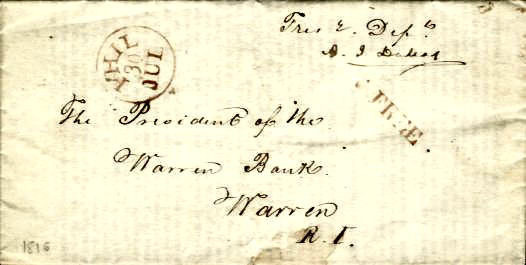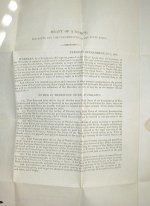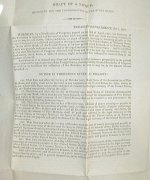![]()
Postal History Introduction
Stampless
Covers
1846
to 1900 Issues
1901-1950
Issues
1951-2003
Issues
Cancels
&
Miscellaneous
Postal
Stationery
Post
Cards
Air
Mail
First
Day &
Event Covers
Parcel Post/Special Delivery
Registered & Official Mail
Commercial & Advertising
Revenue & Postage Due
Wildlife & Game Issues
Complete List of RI Issues
|
Rhode Island Stampless
Covers & Letters |
|||||
|
|||||
|
In 1814, President Madison appointed Alexander Dallas Secretary of the Treasury. By this time; the War of 1812 and the large number of commercial banks issuing worthless bank notes that were not backed by U.S. currency had virtually bankrupted the treasury. Secretary Dallas, in a Report to the Congress in 1816, advocated an annual revenue to be raised by internal taxation in addition to the external revenue already being collected from customs duties. He also advocated and created a "Second" Bank of the United States to issue "Treasury Notes" for the purpose of acquiring additional government funds. Dallas's brilliant and successful plan restored public confidence and greatly improved the government's credit. The circular and notice illustrated here were mailed to various banks; outlining his proposals and encouraging the banks to adopt the new rules and support his strategies for bringing the country out of debt. He also outlined the penalties that would be applied for non-compliance. This particular Stampless Folded Letter was mailed to the President of the Bank of Warren, RI. It contains two items; a personalized letter/circular to the Bank President and a copy of the Treasury Notice to be enacted in October, 1816. The Cover was Free Franked and contains a July 30 Philadelphia CDS. It is signed, "A. J. Dallas." Alexander James Dallas was Secretary of the Treasury under President Madison from 1814 to 1816. He was born on June 21, 1759, the son of a Scottish physician who immigrated to the island of Jamaica in 1750. He received his primary education at Edinburgh and Westminster under the tutelage of James Elphinston and was a friend and acquaintance of both Dr. Johnson and Dr. Franklin. He studied law in London and returned to Jamaica in 1780. Alexander moved to Philadelphia in 1783 and acquired citizenship in the Commonwealth of Pennsylvania in that same year. Alexander was admitted to the bar in 1785 and began a very successful practice a few years later in Philadelphia. |
|||||
|
He was appointed Secretary of the Commonwealth of Pennsylvania in 1791. During his term of office, he compiled the four volume, "Reports of Cases ruled and adjudged by the Courts of the United States and Pennsylvania, before and since the Revolution." He also prepared an edition of "The Laws of Pennsylvania." He held this office until 1801 when President Thomas Jefferson appointed him as the U.S. District Attorney for the Eastern District of Pennsylvania. In 1814, President Madison appointed him to the post of Secretary of the Treasury. At the time of his appointment; the government's finances were in serious arrears because of the recent war with Great Britain and he was requested to present a proposal for raising money to pay off the debt and restore public confidence in the government. Secretary Dallas's masterful report showed that the required funds could not be raised with taxation alone and called for the establishment of a government bank for the purpose of raising a loan. On April 3, 1816, the bill to create a National Bank was passed by Congress and signed by President Madison. Secretary Dallas's efforts greatly improved the credit of the government and helped to erase the debt from the War of 1812. In March 1815, Secretary Dallas assumed the duties of Secretary of War in addition to his position as Secretary of the Treasury. After the new Bank of the United States was firmly established, Alexander retired from both offices in November, 1816 and returned to Philadelphia. He died just a few short weeks later in Trenton, New Jersey on January 14, 1817. The text of the Letter and Treasury Notice sent to the President of the Bank of Warren is reproduced below in it's entirety. |
|||||
|
|||||

RI Historical
Society
Introduction
Stampless I
Stampless II
Stampless III
Stampless IV
Stampless V
Stampless VI
Brown & Ives Letters
The Hazard Family Letters
Joseph Tillinghast
Free Franked Letters
DeWolf Family Letters
Recently Added Pages


